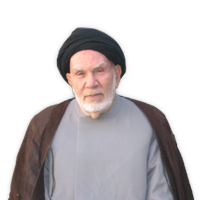The non colonization and the avoidance of repetition
In the Name of Allah
Non-Colonization of Time and Avoiding Repetition
One of the special views and desires of the School of Divine Philosophy practiced by esteemed philosopher, OstadMousavi, is the non colonization of the time of those he addresses and the avoidance of repetition in his speeches. Ostad has repeatedly stated in his speeches and in his classes that any preaching presented in the name of religion should have a scientific aspect to it.
For example, in his booklet on the Holy Surah Rumon page 199 after explaining some superior scientific issues, Ostad says:
What we say is not a story or simple words. If I were to explain to you subjects which you, yourself could study in a Persian book, you could do so without my help. Therefore, it is not acceptable for me to explain such simple subjects. We should present well-prepared scientific topics, which are sometimes complicated and difficult and at other times less complex. In any case, the subject should be presented scientifically.
The question which may arise here is, “What should common people who listen to these scientific subjects do?”
Ostad Mousavi’s answer to the above question has always been as follows: “Common people should not remain common; they should attain knowledge. Such people have not wished to become scientists and have therefore remained common. People should be raised as researchers.”
Ostad Mousavi in his booklet, “Willpower” on page 242 (Teachings on Vol. 6 of MullaSadra’s book, Asfar) has presented a superior research which confirms that thoughts should be renewed during each period of time and that science which is based upon true principles should be revived. For this purpose, he has compared the people of two eras: Those of the time of the prophets and those of the current time. Ostad has studied the expectations of the people of these two periods and says in this regard: From the time of creation of the world one prophet would give its place to another until the time of Prophet Mohammad (PBUH) when the system was saturated and there was no need for another prophet. At those times people did not care to find out the roots of the Quran or the Torah. When a prophet introduced a book, the people would either accept it or not and the role of thought was not very significant. The role of feeling on the other hand was great.
Those days, people were not as innovative as they are presently. For this reason, they would for example travel only 12 kilometers in two weeks in a boat on the sea and would leave everything to destiny and nature. If a favorable wind blew, they would move on and if not they would return. However, these days, huge ships which carry hundreds or thousands of people and travel kilometers during an hour have been designed. This demonstrates the role of thought.
Ostad Mousavi says, “In order to realize the role of thought, one should look at the huge ships of these days or at airplanes which travel across continents. Atomic bombs too, show the significance of thought.
During those days, thoughts were not so well-developed and feelings played a greater role. If a prophet did not exist, they would not listen. A prophet himself had to come and say that he was for example Noah, Salehor Joseph and provide evidence to prove his identity. Sometimes, in spite of the evidence provided by the prophets, people did not have faith in them.
Ostad Mousavi adds, “In fact, a child that is born today is different from a child born a million years ago. This one lives in a different environment, eats different food, and thinks in a different way. Even if people of today met an Infallible Imam, they would await to hear scientific points from the Imam. Such people should do research on the thoughts and beliefs of the Imam in order to have complete faith.
These days if you visit universities, you will see that everyone is waiting to hear scientific points. If they hear scientific points by Prophet Mohammad and Infallible Imams, they are revived. Hence, presently thoughts govern feelings.
In another part of his speech, Ostad says, “This is why subjects presented by those who preach should be similar to (or even of a higher level than) those presented in universities.”
OstadMousavi says in his booklet on “The Body” (part 3, p. 204 based on vol. 5 of MullaSadra’s book, Asfar) with regard to the fact that subjects presented should be lively and strong in order to attract the addressees:
Once we used to teach literature in the sixth grade and when the students wanted to get their diploma in the sixth grade, the subject of philosophy was optional and therefore those who wished took the exam and those who did not want did not do so. The reason was that although the program was very well planned they did not have a qualified teacher of philosophy. There was a center where I taught. When I was about to start teaching philosophy, they did not have the courage to talk with me as I was wearing a turban and a religious cloak. They would look at me under their eyes in a manner to say that you will repent of what you have said in one or two months. However, when I started teaching gradually the class which roomed about 40 students gave its place to the hall of around 250 students. In other words, the same students who used to escape from philosophy classes because they said they did not understand it started liking philosophy very much because they started to understand things.
The above shows the expectations of the present generation which should be met through scientific points and causes the responsibility of those who are in charge to increase.
For example, some wander aimlessly for ten, fifteen, or twenty years in order to get to the bottom of a phenomenon, but they are not able to do so. Hence, they become engaged in words and forget about realities. Such people either do not find realities or forget them. May be they do not know where to start from and therefore follow others’ words. They start writing a book because another one has done so. Because another person calls a few sentences science, they too follow the person and write a similar book. However, this is nothing but colonization of one’s own time and that of others.
OstadMousavi says to professors and teachers at this point:
If you pour repetitive subjects into the minds of your students in your classes, you will be responsible on the Day of Judgment. The money you receive will appear in the form of fire and will cover your body; you yourselves are aware of this. Just as a new day appears after another, a new breath is taken every moment, and new thoughts appear one after another, new science should be presented. You should follow this path. If your students have not understood a few sentences in the previous session, you may repeat them for a few moments, but please inform them what you say is a repetition. If you do not announce it, you will be considered a hypocrite in science. Before presenting the topics, one should do a lot of scientific research and the subjects presented previously should not be repeated.
Ostad Mousavi says in another part of his teachings of Volume 9 of MullaSadra’s book, Asfar in the booklet “The Stages and Stations of Man”, part 15, page 1517:
If common people ask why the topics are not presented in simple words, the answer is: Common and simple words belong to common people. One who is intelligent should understand superior words and not only repetitions.
Some people take up people’s time by saying things which have little or no scientific, moral, or social significance. We should look at the outcome of these speeches. Subjects presented should assist the addressees to come to know what they should do in order not to be brought up a criminal or a thief. They should realize what they should do in order to become a true human and become closer to God.
Ostad Mousavi says:
Once I used to preach in a religious gathering. I invited a person to come and preach. The third session I saw that he was repeating what he had said in the first session. Right in the middle, where around 2,000 people had gathered, I did not allow him to continue with his speech. I said that new topics should be presented in religious gatherings. The reason was that when we take a breath, around 170 factors are involved. Therefore all this greatness should not be wasted with repetition
Ostad Mousavi, in his booklet on “The Body,” part 2, page 195 says:
At this point let us talk about how and why sometimes I repeat some points on gnosis. This is because when I look at the addressees, I realize that they have not fully understood the gnostic topic and hence I repeat it for them to completely understand it. This is not considered to be repetition. We feel concerned about these topics. Be aware that I have so much to talk about that if I live as many years as I have lived up to now and if I preach every single day, I will have new topics to talk about. What I say is not like a mold; I try to disseminate knowledge. Sometimes I merely present a summary of some topics and at other times I explain the same subject in detail.
Generally, true humans do not repeat topics. Those who focus on the reality avoid repetitions. However, when humanity and generosity becomes weak in a person, he/she tends to move towards repetition. No crime is greater than colonizing people’s time and silencing them. The preacher should try to silence the addressees with their hearts and not through using force. Silencing people with force is Haram (religiously forbidden).
This was another feature of OstadMousavi’s philosophy sessions.
Written by one of Ostad Mousavi’s students.




Comments
0